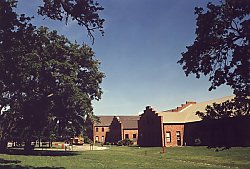
Taxis, Gumbo and marshmallow loving gators: the Southern story
It is already noticeably humid as we leave Houston, and as we start to go through the swamps in Louisiana it feels like Durban. In Lafayette I sit in the bus depot, with cash but no change for the vending machines, so I cannot buy food.
5 PM I arrive in New Iberia, and after searching for a phone, ask at ‘The little river inn’, a local restaurant where they do not only help me find the number for a taxi, but allow me free use of their phone. The cab diver would have been surprised to have a customer if it was a bit less effort, and I load my baggage into the trunk between the cases of beer.
Some time later I get to the Holiday Inn, the only place I could find in the guides, book a room, and go to the first diner I can see for a Crawfish half n’ half and beer. I do not know what crawfish looks like, but it seems like shrimp, and I get half entofee, half fried. Delicious. Back at the hotel one of the oil field workers remark how tired he is after two weeks on a rig, I just smile and say I can believe it.
The problem with a town like this is that it is to small for a public transport system, and to spread out to walk in the southern heat. My hotel is almost outside town, close to the highway that does not pass through it any longer. If I had a car I could have found a B&B or place to stay in (No offence to Holiday Inn, I enjoyed my stay there, but I like to experience things more local) and explored the surroundings more.
As it was, I had to use the taxis all the time. The next morning I thus took a taxi to Avery Island, home of Tabasco and the biggest tourist attraction.
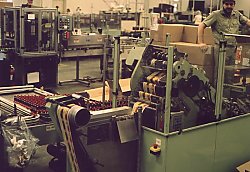 There I watch the promo video, see a bit of the bottling plant and visit the store. The island has a lot more to offer, but I do not have time, I need to check out at 11 AM. The Taxi waits for me at the hotel, and I just grab my bags and head for the Greyhound stop. All in all I spent over $50 on taxis alone in 24 hours, and I realize that I cannot stay.
There I watch the promo video, see a bit of the bottling plant and visit the store. The island has a lot more to offer, but I do not have time, I need to check out at 11 AM. The Taxi waits for me at the hotel, and I just grab my bags and head for the Greyhound stop. All in all I spent over $50 on taxis alone in 24 hours, and I realize that I cannot stay.
At the greyhound station, a counter in the back of a motor spares store with four chairs, I leave my bags and decide to walk though the town. Out of nowhere a woman ask me if I am a tourist, and tells me more about the town and herself as we walk in the direction of the restaurant where she is meeting a friend.
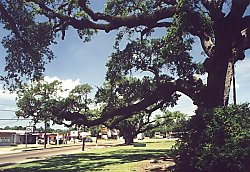 It seems her husband was in the army, and they spend some time in Germany before he retired and they moved back here.
It seems her husband was in the army, and they spend some time in Germany before he retired and they moved back here.
As we parts she points me in the direction of the bayou, and I get to walk across the bayou Teche. A bayou, it seems to me, would be a river if flowing was just a little less of a hassle, so it lays there not doing much at all.
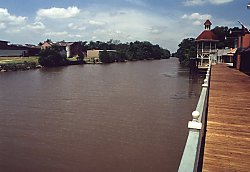 Somehow the boardwalk and centre next to the bayou is completely deserted, no nice eateries, interesting shops. So it is back, and I eat catfish at the friendly Little River Inn, and walk around some more.
Somehow the boardwalk and centre next to the bayou is completely deserted, no nice eateries, interesting shops. So it is back, and I eat catfish at the friendly Little River Inn, and walk around some more.
Back at the bus stop three people are waiting for the bus to Lafayette already. I sit and wait with two women who do not really want to speak, and a man with a tracheotomy trying to draw us into conversation. Somehow is it obvious he wants a prolonged discussion where he will ask vague questions and expects enthusiastic answers. He inhales like Darth Vader through the pipe, sticking out of the white bandage around his neck. Closes it with a finger when he speaks with a voice like a computer generated Bob Dylan.
‘What do you say?’ he asks me after some monologue. ‘Yea, I don’t know’, I reply. The girl next to me shrugs in response to her challenge, reads in some textbook and do not even lift her head. We sit in the humid heat of our David Lynch sketch, sapped of energy, he the only one wanting to speak.
‘Can I ask you something?’ he asks to no one in particular. Nobody answers. Inhale, his whole body sitting up straight with the effort, closes. ‘Can I ask you something?’ he demands again, his voice and face strangely monotone. All wonder what he wants; none wants to be drawn into the discussion.
‘Can I ask you something?’ The ‘I’ this time receiving the slightest italic, the most he can muster. Someone shrugs; we want to be alone in our sweat. ‘You have a lion, a goat, a head of cabbage and one boat’ he starts. But then the bus arrives.
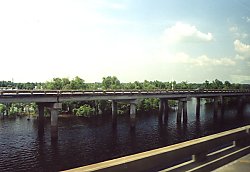 Waiting for the connecting bus in Lafayette, I recharge my telephone card, just in time, before the bus arrives. We drive over the Atchafalya swamp on low bridges cutting through mile upon mile of watery plain. In Baton Rouge I start to call the hotels and hostels in New Orleans for a place for the night, and get a nasty surprise.
Waiting for the connecting bus in Lafayette, I recharge my telephone card, just in time, before the bus arrives. We drive over the Atchafalya swamp on low bridges cutting through mile upon mile of watery plain. In Baton Rouge I start to call the hotels and hostels in New Orleans for a place for the night, and get a nasty surprise.
It is jazz festival weekend, and the place is packed. Most people find my quest slightly funny, I can detect of the phone. When I finally get a place with a room for the night, I am prepared to take it right there and then. ‘Do you not want to look at the room first?’ the person asks. ‘No, how much?’ I ask. ‘$45, but are you sure you do not want to have a look first?’ I want to explain to her that it seems I found the only room left, but fearing I might lose it, I start giving my details. ‘O, wait, she says. $125, because of the festival.’
The bus leaves, and I drive to the city not knowing where I will sleep, and that I just refused the one room I could find. Calling from the bus stop, I find a bed for one night in a hostel, at a much more affordable price. At 11 PM, after I had a much-needed shower and some dinner, the choices are sleep or trying to go into town.
I decide to try and figure out what I must do. I had the bed only for one night, so I have to leave the next day. Frantically I e-mail my friend Christiaan, asking if it would be convenient for me to visit him now, and what his address is. Since none of us have telephones, I also ask his address.
At twelve I get into my bunk bed, on the top on a rickety ladder, the other three beds in the room showing signs that I have three roommates somewhere in town. Three AM they sneak in, trying not to wake me.
The next morning at seven I return the courtesy by sneaking out without waking them. We never spoke a word. Christiaan replied ‘COME’, but no address. I reply that I need his address; he should e-mail it to my sister as well since I will not have e-mail access for the rest of the day. I know he cannot pick me up, he has no car, and so I will have to take a taxi.
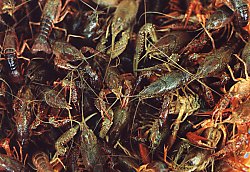 If you have only one day, you have to fit in a lot. So I call a swamp tour company doing free pickups, and have breakfast at a nearby hotel. They drive us out of the city some way, and deposit us at a dock. There is some time before the boat departs, so I wander through a seafood market. As soon as I hear some salesperson confirm that they do accept food stamps, I realize that this is where the local people buy their fish, prawns, crawfish and bluecrabs.
If you have only one day, you have to fit in a lot. So I call a swamp tour company doing free pickups, and have breakfast at a nearby hotel. They drive us out of the city some way, and deposit us at a dock. There is some time before the boat departs, so I wander through a seafood market. As soon as I hear some salesperson confirm that they do accept food stamps, I realize that this is where the local people buy their fish, prawns, crawfish and bluecrabs.
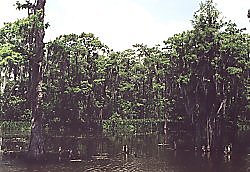 At the tour’s dock I see their nutria rat, the raccoon show and listen to the naturalist tell us about the big gators. He pass a tame snake around, and show a bit of gator fish skin, a hardened armor plate. We board, and get taken through the cypress swamp, narrated by our friendly captain. Close to the dock we pass alongside a pump station. Since the surrounding area is lower than the swamp, they pump out the water all the time.
At the tour’s dock I see their nutria rat, the raccoon show and listen to the naturalist tell us about the big gators. He pass a tame snake around, and show a bit of gator fish skin, a hardened armor plate. We board, and get taken through the cypress swamp, narrated by our friendly captain. Close to the dock we pass alongside a pump station. Since the surrounding area is lower than the swamp, they pump out the water all the time.
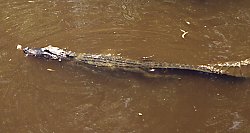 When we see an alligator our captain grabs some marshmallows, and throw them into the water. Immediately the gator eats them. Later the children would throw marshmallows at every gator, they cannot seem to get enough. We also see gator traps. Since a hunter gets a license for a number of gators, he tries to get the biggest gators he can, and will for that reason hang a baited hook out of the water, where only the big ones can get to it. For me the swamps were something I always wanted to experience, and I am very pleased with the trip.
When we see an alligator our captain grabs some marshmallows, and throw them into the water. Immediately the gator eats them. Later the children would throw marshmallows at every gator, they cannot seem to get enough. We also see gator traps. Since a hunter gets a license for a number of gators, he tries to get the biggest gators he can, and will for that reason hang a baited hook out of the water, where only the big ones can get to it. For me the swamps were something I always wanted to experience, and I am very pleased with the trip.
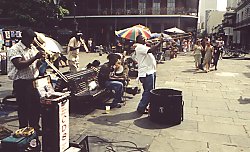 Afterwards I ask to be dropped of in the French Quarter, and I start to wander about there for the afternoon. Lunch consist of crawfish entofee and a daiquiri, I do not really care about the cost. I walk past the Preservation Hall, sit on the bank of the Mississippi, remembering the works of my taxi driver to Avery Island: ‘Now remember, nworlens is the slickest town in the states, do not carry your wallet in your back pocket, ok? And don’t go speaking to no one in the street, even if they ask you for a light, you don’t smoke, ok?’
Afterwards I ask to be dropped of in the French Quarter, and I start to wander about there for the afternoon. Lunch consist of crawfish entofee and a daiquiri, I do not really care about the cost. I walk past the Preservation Hall, sit on the bank of the Mississippi, remembering the works of my taxi driver to Avery Island: ‘Now remember, nworlens is the slickest town in the states, do not carry your wallet in your back pocket, ok? And don’t go speaking to no one in the street, even if they ask you for a light, you don’t smoke, ok?’
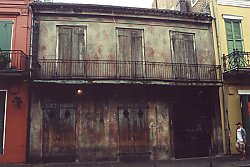 But nothing happens, just some guy in robes wanting to speak to me about my soul. Perhaps he was eyeing my camera. The French quarter seem like it could be a brilliant place, but at the same time I do get a very touristy feeling, it seems the biggest scams are inside the shops. But the old buildings remain, with their wrought iron work. I suppose that in the evening wonderful jazz can be found.
But nothing happens, just some guy in robes wanting to speak to me about my soul. Perhaps he was eyeing my camera. The French quarter seem like it could be a brilliant place, but at the same time I do get a very touristy feeling, it seems the biggest scams are inside the shops. But the old buildings remain, with their wrought iron work. I suppose that in the evening wonderful jazz can be found.
For me this was not the New Orleans I imagine, and in a way I do not feel that I have been to that place. Perhaps I can someday experience something without drunken kids on summer vacation experimenting with their alcohol capacity for the first time. Perhaps the place in my mind does not exist any more.
I eat a po’boy, jump on the St Charles streetcar back to the hostel where my bags are in a locker. Still no word from Christiaan, but I decide to go to Lincoln, Nebraska. When I leave, it is not so much the city that I miss, but I would one day love to go through the small towns like New Iberia again, this time going on the swamps for a week, living there with the people who call it home. If I can find them, then I will find the city.
Hold your cursor over a photo for the caption, click on photo for enlargement
|
Back: Fajitas, Enchiladas and the Pink Adobe: the Santa Fe story |
Up: Roadtrip, USA 2001 |
Next: Books, CD's and coffee: the Lincoln story |
Comments, problems or suggestions? Please mail me at webmaster@haarhoff.net